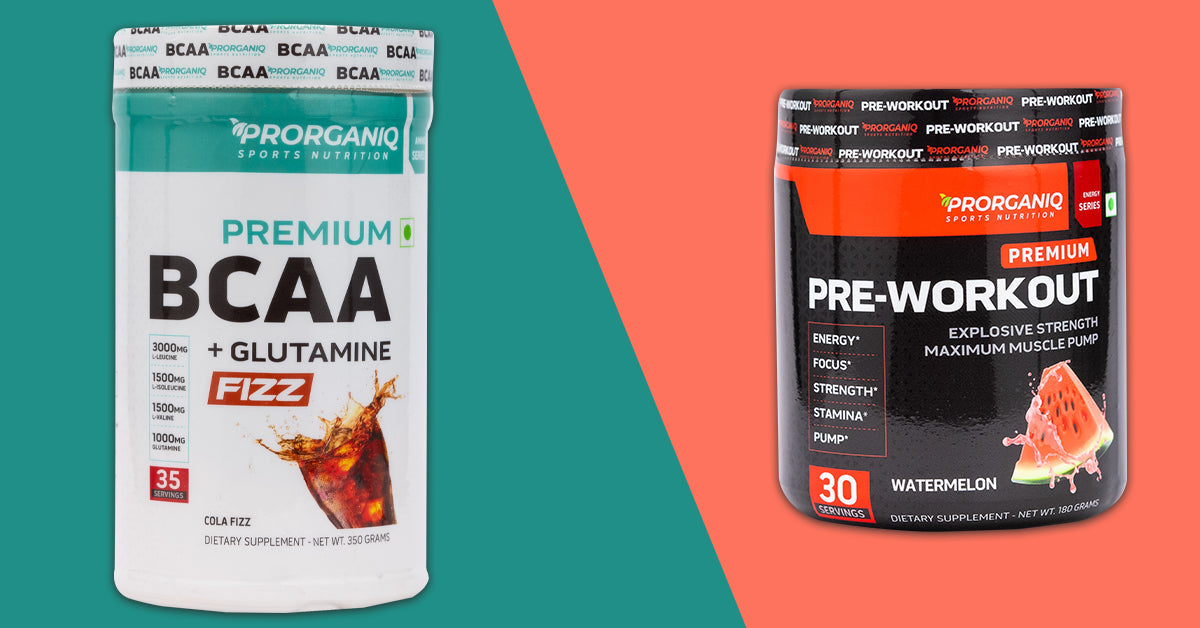BCAAs vs Pre Workout
As a gym enthusiast, you are bound to hear some debates about BCAA and pre-workout supplements. For the most part, the arguments used to support one product are pseudoscience.
However, due to the marketing strategies of these products, many people find themselves confused in choosing the best one.
The ads that display these products claim that they promote muscle growth, weight loss, and physical performance. In reality, things are a bit more complicated than this.
In this article, we will cover everything you need to know about the differences and shared features between a pre-workout supplement and BCAAs.
What is BCAA?
BCAAs, or branched-chain amino acids, consist of three amino acids:
- Leucine
- Isoleucine
- Valine
These amino acids are essential. In other words, your cells cannot produce them, leaving dietary intake as the exclusive source.
The main purpose of taking BCAAs is to help your muscle fibers heal from the microscopic damage inflicted during workouts.
Since your body is smart, it will make the muscles bigger to cope with future strains.
The Benefits of BCAAs:
While manufacturers mainly focus on marketing BCAA as a muscle-building supplement, it actually offers several health benefits.
Here is a shortlist of the main benefits:
- Promotes muscle growth after working out
- Provides the cellular repair machinery with the building blocks it needs
- Lowers the threshold of fatigue during exercises
- Prevents muscle wasting
- Decreases blood glucose levels
- Boosts lipolysis (i.e., fat burning) and weight loss
When should you take BCAA supplement?
Many athletes obsess about when to take their BCAA blend.
While it would make sense to take the supplement just before or immediately after exercise, researchers found that taking BCAAs just before your workout is beneficial for delayed-onset muscle soreness (DOMS)
Therefore, you should just take the supplement around your time of workout to supply your body with the essential amino acids.
The potential side effects of BCAA
BCAAs are generally safe. The amino acids included in this supplement are already abundant in your diet.
However, make sure not to overdo it, especially with the dosage. In some cases, you might get tempted to increase the dose after seeing great results.
Unfortunately, this could backfire, leading to symptoms, such as fatigue, dizziness, nausea, and headaches.
What is a Pre-workout supplement?
A pre-workout supplement consists of numerous ingredients that boost energy levels and endurance during training.
They also lower the threshold of fatigue to increase the efficiency of your exercises.
As a result, you will be able to exercise harder and for a longer period of time.
Because the effects of this supplement are immediately felt after taking it, people argue that it’s superior to BCAA.
In reality, the two supplements serve slightly different purposes.
The benefits of a pre-workout supplement
A pre workout supplement will boost your physical performance while helping with the process of muscle hypertrophy.
If you eat a balanced diet that is rich in protein and add this supplement to your workouts, you will have the perfect recipe for muscle growth and increased athleticism.
Unfortunately, many gym-goers do not reach their recommended intake of protein, which is why BCAA comes in handy.
Here are some benefits of a pre-workout supplement:
- Increases energy and explosivity during workouts
- Enhances physical strength, allowing you to lift heavier weights
- Boosts endurance to perform more sets and reps
- Increases mental focus
- Ramps up lipolysis
When should you take your pre-workout supplement?
Obviously, you should take your pre-workout supplement before your exercise. As a rule of thumb, aim for 15–30 minutes before warming up.
Depending on your digestive system and metabolic rate, you may want to adjust this time window after some experimenting.
The potential side effects of a pre-workout supplement
Despite the great benefits offered by this supplement, it can lead to some side effects.
Since it’s s simulant, insomnia and jitters are common adverse health effects. Additionally, some people feel lethargic after the effects of the supplement wear off.
On a final note, make sure to drink plenty of water since the ingredients in most pre-workout supplements have a dehydrating effect.
From a general point of view, a pre-workout supplement works better for people who want to boost their athleticism and exercise harder. Eventually, this will also lead to muscle hypertrophy.
With that said, if you do not cover your daily protein needs, you will end up with burning muscles but no building blocks to make them grow.
Takeaway message
Choosing between a pre-workout supplement and BCAA can be a challenging task, especially when you lack the scientific evidence to support the superiority of either one of them.
We hope that this article helped you understand the value, benefits, and differences between a pre-workout supplement and BCAAs.
Also Read:
Creatine vs BCAA


